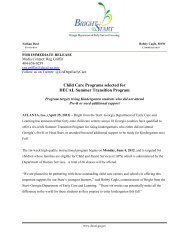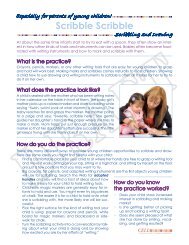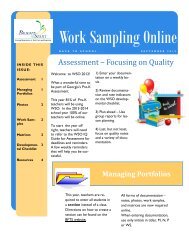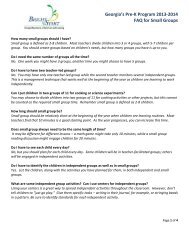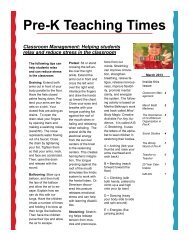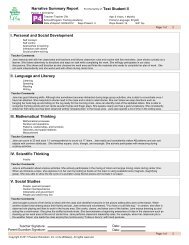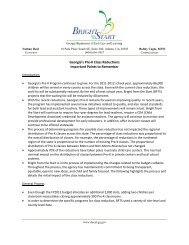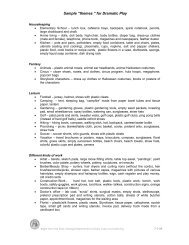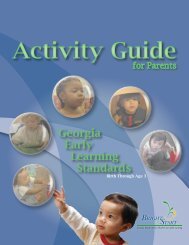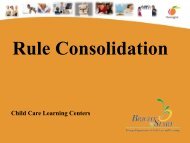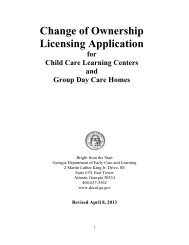- Page 2 and 3:
Copyright 2007 Bright from the Star
- Page 5:
Contents Acknowledgements..........
- Page 8 and 9:
v • • • • based on high qua
- Page 10 and 11:
v Learning Tips Throughout the Acti
- Page 12 and 13:
Gain control of head and body as th
- Page 14 and 15:
Up the Hill Stack some firm cushion
- Page 16 and 17:
Gain control of hands and fingers a
- Page 18 and 19:
Finger Play Seat the infant in a
- Page 20 and 21:
10 Begin to help with feeding as th
- Page 22 and 23:
1 Goody Two Shoes After naptime, ta
- Page 24 and 25:
1 Respond to verbal or physical sig
- Page 26 and 27:
1 Redirect or Remove! (for a younge
- Page 28 and 29:
18 Show attachment toward significa
- Page 30 and 31:
20 In Plain Sight Place an infant o
- Page 32 and 33:
22 Show awareness of other children
- Page 34 and 35:
24 Hat Trick Sit on a mat or carpet
- Page 36 and 37:
26 Show beginning sense of self as
- Page 38 and 39:
28 We Are Proud of You! Get a suppl
- Page 41 and 42:
Standards: • Learning approaches
- Page 43 and 44:
Learning approaches for development
- Page 45:
Use commercial or teacher-made toys
- Page 48 and 49:
38 Understands spoken words (recept
- Page 50 and 51:
40 Pat the Bunny Make your own litt
- Page 52 and 53:
42 Expresses thoughts with sounds,
- Page 54 and 55:
44 M K O II I T D N II S O N For Yo
- Page 56 and 57:
46 Tips about Bilingual Development
- Page 58 and 59:
48 Foundations for reading Puppet S
- Page 60 and 61:
50 Dino the Dinosaur Make it “Com
- Page 62 and 63:
52 Explore objects with different s
- Page 64 and 65:
54 The Shape and Size of Things Giv
- Page 66 and 67:
56 Actively explore the environment
- Page 68 and 69:
58 Nature’s Wonders Take the infa
- Page 70 and 71:
60 Begin to recognize significant f
- Page 72 and 73:
62 Transition Apron Use a full-body
- Page 74 and 75:
64 Gross motor skills Begin to cont
- Page 76 and 77: 66 A Tisket a Tasket Put a few ball
- Page 78 and 79: 68 Control hands and fingers as the
- Page 80 and 81: 70 Knob Puzzles Put several three o
- Page 82 and 83: 72 Help with feeding as they: •
- Page 84 and 85: 74 Dressing Up Create a prop box th
- Page 86 and 87: 76 Respond to verbal or physical si
- Page 88 and 89: 78 Night Night Gather a few dolls a
- Page 91 and 92: Standards: 1 • Personal relations
- Page 93 and 94: Personal relationships with adults
- Page 95 and 96: Forming attachments to parents and
- Page 97 and 98: Personal relationships with peers H
- Page 99 and 100: So Happy. So Sad Cut out large pict
- Page 101 and 102: 1One year olds Self-awareness Show
- Page 103 and 104: Frame It! Make “picture frames”
- Page 105 and 106: Regulate emotions and behaviors wit
- Page 107 and 108: Step Safety During diapering and ha
- Page 109 and 110: Express themselves creatively throu
- Page 111 and 112: Oatmeal Shake It Up, Baby! Collect
- Page 113 and 114: Standards: 1 • Learning approache
- Page 115 and 116: Learning approaches for development
- Page 117 and 118: Where Did it Go? Get three empty sq
- Page 119 and 120: Standards: 1 • Understands spoken
- Page 121 and 122: Understands spoken words (receptive
- Page 123 and 124: Communicate without words, using mo
- Page 125: Expresses thoughts with sounds, wor
- Page 129 and 130: Foundations for reading Listen to s
- Page 131 and 132: Our Favorite Toys Find pictures of
- Page 133 and 134: Scribble spontaneously as they: •
- Page 135 and 136: Mark and Erase Have one or two smal
- Page 137 and 138: Standards: 1 • Foundations for ma
- Page 139 and 140: Explores concepts related to measur
- Page 141 and 142: Big Doll, Little Doll Organize some
- Page 143 and 144: Be sure all toys and materials are
- Page 145 and 146: Foundations for science Activities
- Page 147 and 148: If You’re Happy... Sit with a lar
- Page 149 and 150: Give one year olds opportunities to
- Page 151 and 152: Foundations for social studies SAFE
- Page 153 and 154: The preschool program is an extensi
- Page 155 and 156: Standards: • Gross motor skills
- Page 157 and 158: Gross motor skills Activities and S
- Page 159 and 160: Knock ‘Em Down Bowling Gather 6-1
- Page 161 and 162: Fine motor skills Activities and St
- Page 163 and 164: Oatmeal Stack Up Offer the children
- Page 165 and 166: Feed themselves as they: • •
- Page 167 and 168: Jacket Acrobats Try this to help ch
- Page 169 and 170: Two year olds show signs of indepen
- Page 171 and 172: Health and safety skills Activities
- Page 173 and 174: Healthy Snacks Let the children hel
- Page 175 and 176: Standards: 2 • Personal relations
- Page 177 and 178:
Personal relationships with adults
- Page 179 and 180:
The Cuddling Chair Place a large ro
- Page 181 and 182:
Demonstrate beginning social skills
- Page 183 and 184:
How Do You Feel? Make two large fac
- Page 185 and 186:
Show behaviors that reflect their s
- Page 187 and 188:
Wall of Pride Ask parents to donate
- Page 189 and 190:
Begin to regulate their own emotion
- Page 191 and 192:
Terrible Monster At circle time, re
- Page 193 and 194:
Young children do best in environme
- Page 195 and 196:
Self-expression Activities and Stra
- Page 197 and 198:
Encourage children to express thems
- Page 199 and 200:
Standards: 2 • Learning approache
- Page 201 and 202:
Learning approaches for development
- Page 203 and 204:
Natural curiosity can put two year
- Page 205 and 206:
Standards: 2 • Understands spoken
- Page 207 and 208:
Understands spoken words (receptive
- Page 209 and 210:
Shoebox Babies In the Dramatic Play
- Page 211 and 212:
Use oral language for creative expr
- Page 213 and 214:
Give Me a Word For... In a small gr
- Page 215 and 216:
Surround your twos with meaningful
- Page 217 and 218:
Foundations for reading Our Familie
- Page 219 and 220:
ten little toes ten little fingers
- Page 221 and 222:
Scribble as they: • • • Imita
- Page 223 and 224:
It’s My Birthday! Make a poster t
- Page 225 and 226:
Standards: 2 • Foundations for ma
- Page 227 and 228:
Build beginning measurement concept
- Page 229 and 230:
Lots of Lotto Cut out pictures of o
- Page 231 and 232:
Counting Finger Plays Do finger pla
- Page 233 and 234:
Look at pictures in a book such as
- Page 235 and 236:
Foundations for science Activities
- Page 237 and 238:
Oil and Water Don’t Mix! Get a me
- Page 239 and 240:
Recognize family roles and personal
- Page 241 and 242:
Nose-to-Nose Ahead of time, collect
- Page 243 and 244:
I’ll Drive the Bus Gather a group
- Page 245 and 246:
Standards: • Gross motor skills
- Page 247 and 248:
Gross motor skills A Trip Through t
- Page 249 and 250:
Invite children to stand up and act
- Page 251 and 252:
Fine motor skills Activities and St
- Page 253 and 254:
Squeezable Art Cover a table with n
- Page 255 and 256:
Feed themselves as they: • •
- Page 257 and 258:
Wash, Dry, and Score As part of you
- Page 259 and 260:
Pay attention to safety instruction
- Page 261 and 262:
Feed Me Monster Make a “Feed Me M
- Page 263 and 264:
Standards: 3 • Personal relations
- Page 265 and 266:
Personal relationships with adults
- Page 267 and 268:
Boo Boo Bunny to the Rescue Choose
- Page 269 and 270:
Personal relationships with peers A
- Page 271 and 272:
Look for opportunities to make posi
- Page 273 and 274:
Self-awareness My Favorite Things A
- Page 275 and 276:
Regulate own emotions and behavior
- Page 277 and 278:
A Quiet Space Read a book about str
- Page 279 and 280:
Express themselves creatively throu
- Page 281 and 282:
Rainforest Rain Sticks Ask parents
- Page 283 and 284:
Encourage children to express thems
- Page 285 and 286:
Standards: • Acquire learning app
- Page 287 and 288:
Acquire learning approaches that su
- Page 289 and 290:
What Can We Make? Set up a low bala
- Page 291 and 292:
Standards: 3 • Understands spoken
- Page 293 and 294:
Understands spoken words (receptive
- Page 295 and 296:
Young children learn the meaning of
- Page 297 and 298:
Use oral language for creative expr
- Page 299 and 300:
The Cat’s Out of the Bag Put seve
- Page 301 and 302:
Allow children to express themselve
- Page 303 and 304:
Build print awareness as they: •
- Page 305 and 306:
A Puzzling Name Write each child’
- Page 307 and 308:
When you find a book that the child
- Page 309 and 310:
Foundations for writing Activities
- Page 311 and 312:
Gel Bags Fill some plastic bags abo
- Page 313 and 314:
Standards: 3 • Foundations for ma
- Page 315 and 316:
Build measurement concepts as they:
- Page 317 and 318:
All Sorts of Things Gather a set of
- Page 319 and 320:
The Long and Short of It Make “fe
- Page 321 and 322:
Look at pictures in a book such as
- Page 323 and 324:
Foundations for science Activities
- Page 325 and 326:
Heavy Lifting Gather objects of dif
- Page 327 and 328:
Recognize family roles and personal
- Page 329 and 330:
Who Am I? Collect various props use
- Page 331 and 332:
Take time to become well acquainted
- Page 333 and 334:
Books, Books, and More Books The bo
- Page 335 and 336:
Circus of Colors by Lisa Hopp Cloth
- Page 337 and 338:
Allen, K. & Marotz, L. (2003). Deve




